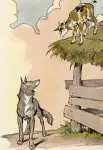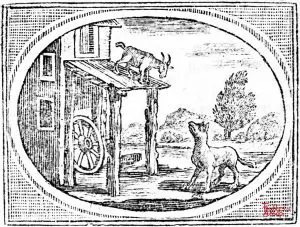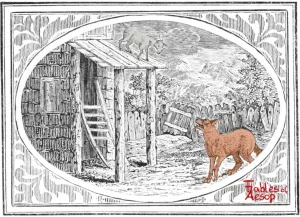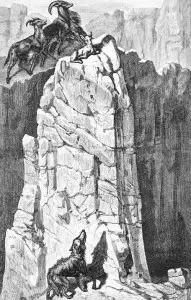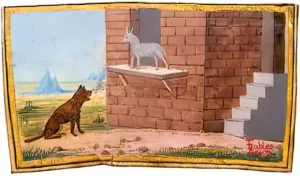A Kid on top of a house shouted at a Wolf below. The Kid could only get away with that so long as he was on the roof.
It is easy to be brave from a safe distance.

Aesop For Children
A frisky young Kid had been left by the herdsman on the thatched roof of a sheep shelter to keep him out of harm’s way. The Kid was browsing near the edge of the roof, when he spied a Wolf and began to jeer at him, making faces and abusing him to his heart’s content.
“I hear you,” said the Wolf, “and I haven’t the least grudge against you for what you say or do. When you are up there it is the roof that’s talking, not you.”
Moral
Do not say anything at any time that you would not say at all times.

Eliot/Jacobs Version
A Kid was perched on the top of a house. Looking down saw a Wolf passing under him. Immediately he began to taunt his enemy. “Murderer and thief,” he cried, “what do you here near honest folks’ houses? “Curse away, my young friend,” said the Wolf. “It is easy to be brave from a safe distance.”

Samuel Croxall
A KID. being mounted upon the roof of a shed, and seeing a Wolf below, loaded him with all manner of reproaches. Upon which, the Wolf, looking up, replied, Do not value yourself, vain creature, upon thinking you mortify me; for I look upon this ill language, as not coming from you, but from the place which protects you.
THE APPLICATION
To rail and give ill language, is very unbecoming, not only in gentlemen in particular, but men in general: nor can we easily determine whether courage or manners are most wanting in the person who is given to use it. Now, when any one is so screened and protected by the place he is in, that he may commit such indecencies with impunity, however his carcase may escape scot free, yet he is sure to pay for it in his reputation; it being impossible we should think him a man of honour, who endeavours to wound us from the advantage, of the place in which he happens to be, and refuses to engage us upon equal terms. Whenever, there.ore [sic], we are attacked by one, whom the company we are in or some other circumstance, makes it improper or impracticable for us to come at, let us wisely curb our passions of resentment, by considering, that it is not the silly person who speaks, but some situation, by which, he is secured, that utters the reproach against us. The same reflection may serve also to divert, instead of exasperating us, at the impotent malice of those poor spirits, who, at the same time that they take advantage of a place to brandish their infamous tongues against us, show how much they fear us, and that they durst not do it, unless they knew themselves to be out of the reach of our resentment.

Thomas Bewick (The Kid and The Wolf)
A Kid being mounted upon the roof of a high shed, and seeing a Wolf below, took the opportunity of affronting him with the foulest reproaches: upon which the Wolf looking up, replied, Do not value yourself, vain creature, upon thinking you mortify me, for I look upon this ill-language not as coming from you, but from the place which protects you.
APPLICATION.
Place a coward out of the reach of danger, and then no man can put on an appearance of greater courage. In his castle he makes a great deal more bluster and threatening than a man of spirit and honour would do, if placed in the same situation. A similar kind of overbearing behaviour too often shews itself in the upstart worthless placeman, who taking advantage of his situation, which protects him, and knowing that he is out of the reach of our resentment, exhibits all the “insolence of office:” but such should be put in mind, that a saucy deportment is no sign of either courage, good sense, or good manners, and that a gentleman and a man of spirit will use no ill or unbecoming language to any person, however low in station.
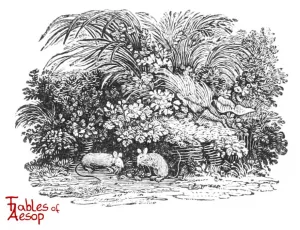

JBR Collection
A Kid, mounted upon a high rock, bestowed all manner of abuse upon a Wolf on the ground below. The Wolf, looking up, replied, “Do not think, vain creature, that you annoy me. I regard the ill language as coming not from you, but from the place upon which you stand.”

Townsend version
A kid standing on the roof of a house, out of harm’s way, saw a Wolf passing by and immediately began to taunt and revile him. The Wolf, looking up, said, “Sirrah! I hear thee: yet it is not thou who mockest me, but the roof on which thou art standing.”
Moral
Time and place often give the advantage to the weak over the strong.

Gherardo Image from 1480

Haedus in Tecto et Lupus
Haedus, in superiori cuiusdam altissimae domus parte cum esset, ut vidit lupum praetereuntem, eum conviciis insectari coepit. Cui lupus “Non tu mihi,” ait, “convicia haec ingeris, sed locus in quo degis.”
Moral
Fabula significat quod locus et tempus contra potentiores persaepe audaciam addunt.
Perry #098
